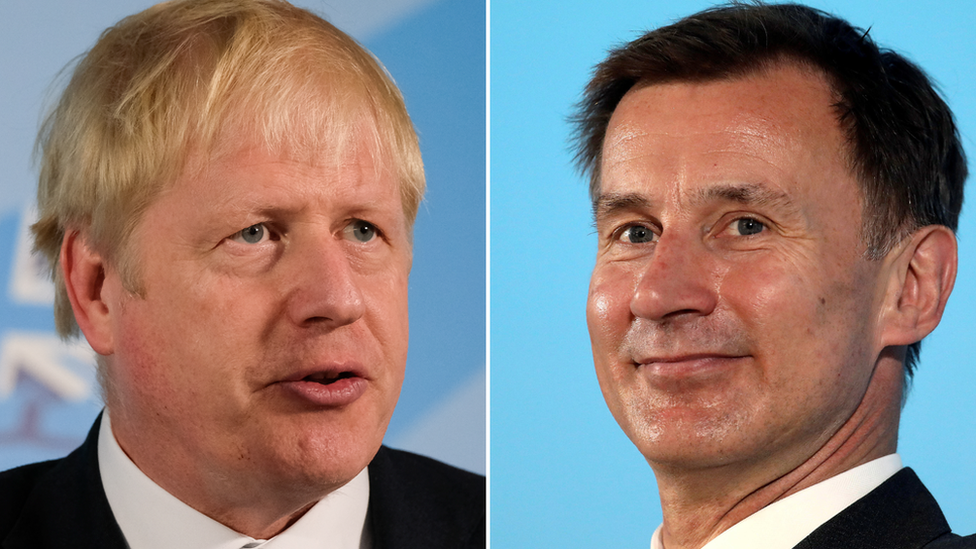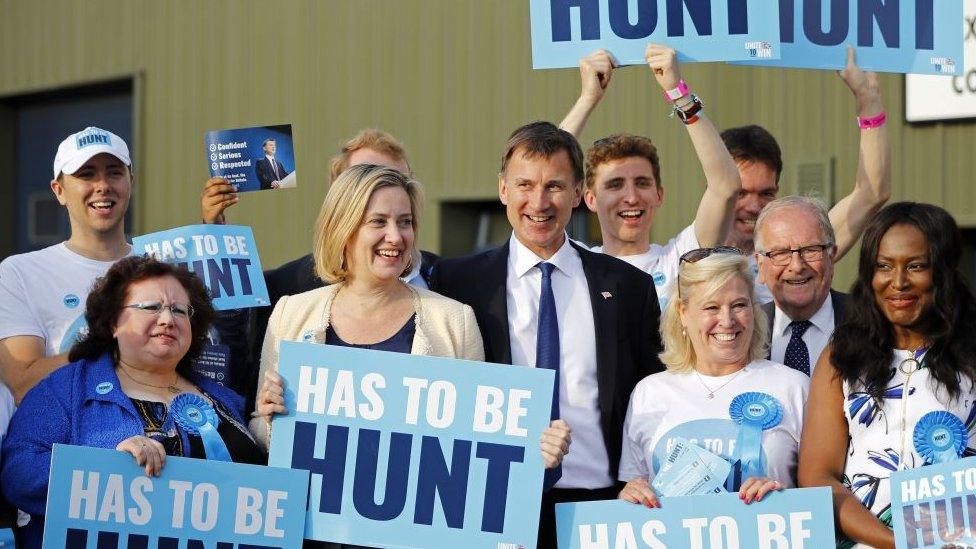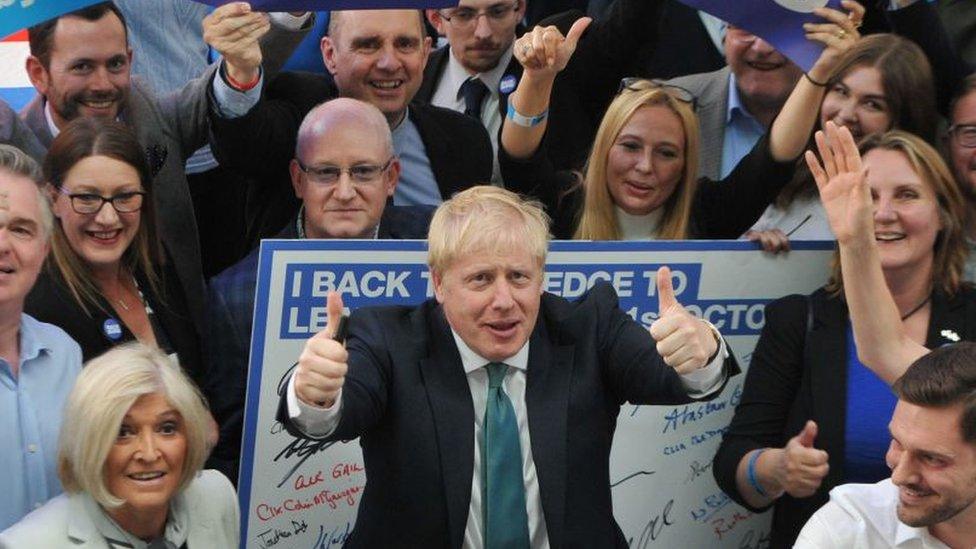Boris Johnson and Jeremy Hunt: The Andrew Neil interviews fact-checked
- Published

The Reality Check team has been fact-checking claims made by Boris Johnson and Jeremy Hunt during their interviews with the BBC's Andrew Neil.
Both want to succeed Theresa May as Conservative leader and prime minister. They were asked about their Brexit strategies, their tax and spend policies and about their characters.
Here are some of the claims they made, starting with Jeremy Hunt's:
Jeremy Hunt

1. A Brexit deal can be agreed by end of September
Jeremy Hunt says he can negotiate a new deal for the UK to leave the EU "by the end of September".
He would focus on changes to the Irish backstop. This is the insurance policy - agreed by Theresa May and the EU - to prevent a "hard Irish border" after Brexit.
It would potentially keep the UK in a close trading relationship with the EU (to avoid border checks) but many Conservative MPs viewed this as a "trap" and rejected her deal.
Verdict: The EU has said repeatedly that it is not prepared to reopen the text of the current withdrawal agreement, which includes the Irish backstop.
Moreover, the UK government - of which Mr Hunt (unlike his opponent) is a senior member - accepted that restriction when it signed up to the terms of the current Brexit extension, which runs out on 31 October.
He says the German Chancellor Angela Merkel has told him she would look at "a different plan" for the Irish border but even if the EU as a whole were to suddenly and unexpectedly change its mind on renegotiation, Mr Hunt would have only a matter of weeks to get it through parliament.
2. 80% of those who voted chose pro-leave parties
We had a general election in which over 80% of the country voted for parties that wanted to leave the European single market and leave the customs union.
Verdict: If you add the percentage of voters who backed the Conservatives and UKIP (who both advocated leaving the single market and the customs union) and Labour in the 2017 election, you get to 84.2%.
But Labour wasn't explicit in its 2017 manifesto about leaving both. It said it wanted a Brexit deal "retaining the benefits of the single market and the customs union". It also said "freedom of movement will end" which suggests leaving the single market.
3. An extra 1.5% of economic growth would give the government an extra £20bn to spend
[The US] is now growing at about twice our rate – about 3% compared to our 1.5%. If we did that in this country we would have an extra £20bn to spend.
Mr Hunt said that if our economic growth were 3% instead of 1.5%, that would give the government an extra £20bn to spend.
Verdict: It is very unlikely that an extra 1.5% of economic growth would give the government an extra £20bn to spend, especially when tax rates have been cut.
The mechanism going from economic growth to government revenue is not entirely straightforward, but let's look at a rough calculation.
The value of everything produced in the economy is about £2.2tn a year.
1.5% of that is £33bn, so Mr Hunt is talking about an extra £33bn of stuff produced in the economy leading to an extra £20bn in government revenue, despite there having been a big tax cut.
That seems unlikely. As an illustration of why, the tax take currently amounts to, external about 37% of GDP, whereas £20bn is 61% of £33bn.
4. Secured the biggest single increase in NHS funding
Mr Hunt was asked about NHS funding during his time as health secretary. He said he'd secured an extra £20bn a year, which he said was "the biggest single increase".
Verdict: The NHS is getting billions more each year, but it won't actually get the extra £20bn a year until 2023-24.
If you look at the average annual increase until that date, it's 3.4% above inflation.
This is lower than the post-war average increase of 4.1%.
Looking at the percentage increase after inflation gives a more accurate picture than just looking at the amount of cash injected.


Boris Johnson

1. Cut crime in London by about 20%
Boris Johnson said that crime in London fell by about 20% during his time as London mayor.
Verdict: That's true. But it sounds slightly less impressive when you consider that crime in the whole of England and Wales fell by 26% (a fact which Mr Neil pointed out).
He also talked about the homicide rate, which fell by about 50% between 2008 and 2016 in London.
It had been falling since 2003, when it reached a peak of 211 homicides in one year.
So it looks like these things, at least to some extent, form part of both a longer-term trend and a wider trend across the country.
2. The Irish border can be sorted out after Brexit
Mr Johnson said, as he has several times, that the Irish backstop should be "deleted" from Theresa May's withdrawal agreement. He believes that discussions on the Irish border should take place after Brexit, as part of trade negotiations.
Verdict: This looks like a non-starter, because the EU has consistently said it won't accept a withdrawal agreement without a backstop in it. The EU also says it will not open future trade talks until the issue of the Irish border (along with EU citizens' rights and the UK's financial obligations) has been settled.
3. Article 24 would allow a zero-tariff arrangement with the EU
It might be possible, for instance, as we come out, to agree under Gatt 24 paragraph 5b that both sides agree to a standstill… until such time as we do a free trade deal.
Throughout the Conservative leadership contest, Boris Johnson has insisted that Article 24 of the General Agreement on Tariffs and Trade (GATT), would allow the UK and EU to continue to trade freely (ie no taxes applied on imports) in the event of a no-deal Brexit.
This arrangement would continue, according to Mr Johnson, until a permanent free trade deal was reached between both sides.
Verdict: It would not happen unless a trade deal between the UK and the EU was already agreed in principle, and both sides were happy to proceed with Article 24 (ie the UK can't just impose it) - something which Andrew Neil highlighted and Mr Johnson acknowledged.
But getting the EU to agree to use Article 24 will be extremely difficult. The EU has insisted, throughout the Brexit negotiations, that it will only discuss trade once other issues (such as the UK's financial obligations) are sorted.
Even if Article 24 was used, it only solves the tariff issue (taxes on imports). It doesn't deal with other barriers to trade, such as product standard checks which would be required should the UK leave the single market.
4. EU trade balance
The EU has a very substantial balance of trade with us - they have a considerable surplus in goods alone of I think about £65bn.
Mr Johnson insisted that the EU would be keen to agree a deal which kept the status quo, even if a withdrawal agreement could not be reached.
His argument in favour of this was that it would be in the EU's interests because it has such a big trade surplus (which means the EU exports more to the UK than vice versa) with the UK.
Verdict: Mr Johnson is right that the EU has a substantial trade surplus with the UK when it comes to goods - although his figure is not quite right.

In 2018, the EU had an overall trade surplus, external in goods and services of £64bn with the UK.
Mr Johnson was referring to that as just being the deficit in goods. Actually, the deficit in goods, external was considerably bigger than that (£93bn) but the overall figure was reduced by the UK's surplus in services (£29bn).
But it's worth pointing out that as a percentage of trade overall, UK/EU trade is more important to the UK than to the EU.


